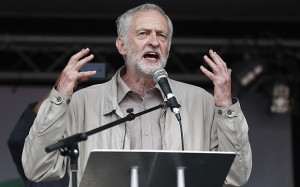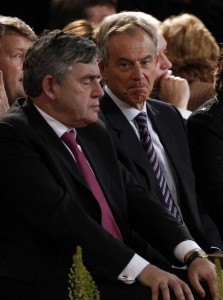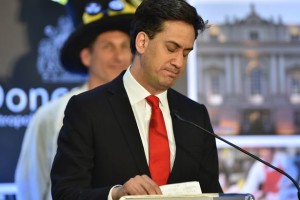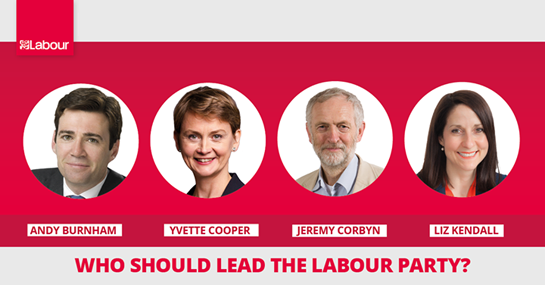It’s hardly surprising that the U.S. media are providing obsessive coverage of Donald Trump’s egocentric campaign for the 2016 Republican presidential nomination. After all, nothing attracts today’s ratings-driven media quite like a freak show or impending doom. Trump’s campaign offers both.
Meanwhile, the media are providing relatively little coverage of Bernie Sanders’s holistic campaign for the 2016 Democratic presidential nomination. You’d think his David-versus-Goliath challenge to Hillary’s coronation would be replete with fodder for ratings exploitation. But even this potential spectacle cannot compete with Trump’s three-ring circus.
 This brings me to the challenge Jeremy Corbyn is mounting in Britain for next month’s Labour Party leadership election. For his campaign is offering both the spectacle of Trump’s and the substance of Bernie’s, which is compelling the UK media to provide due coverage.
This brings me to the challenge Jeremy Corbyn is mounting in Britain for next month’s Labour Party leadership election. For his campaign is offering both the spectacle of Trump’s and the substance of Bernie’s, which is compelling the UK media to provide due coverage.
Here, for example, is how The Guardian characterized the “unusual interest” Corbyn’s campaign is generating, especially among “young people, long alienated from politics,” in an editorial on August 13:”
There’s been no talk, as last time, of there being little to choose between the candidates. A yearning for plain speaking over soundbites is evident, as is a hunger for a full-throated alternative to the reinvigorated Tory government over austerity, social security and the wealth gap. There is overdue debate about the links between big business and politics, as well as about inequalities of class, race and gender.
In fact, the New York Times could fairly write a similar editorial about the substantive nature of and unusual interest in Bernie’s campaign.
 The irony, though, is that the spectacle surrounding Corbyn’s campaign stems from the hysteria it’s inciting among party stalwarts, including former Prime Ministers Tony Blair and Gordon Brown.
The irony, though, is that the spectacle surrounding Corbyn’s campaign stems from the hysteria it’s inciting among party stalwarts, including former Prime Ministers Tony Blair and Gordon Brown.
Gordon Brown is to intervene in Labour’s leadership race for the first time, saying the party needs credible economic policies to win power.
Mr. Brown, the former prime minister, will deliver an address on ‘power for a purpose.’
It comes after his predecessor at Number 10, Tony Blair, warned that Labour risked annihilation if it elects Mr. Corbyn – currently seen as the front-runner.
(BBC, August 16, 2015)
Labour’s establishmentarians fear that Corbyn’s full-throated socialist policies will doom any chance their party has of serving as a credible opposition to the Conservative (Tory) Party, which won a surprisingly decisive victory in parliamentary elections last May.
 Their fear is understandable. After all, far from embracing the triangular (aka Tory-light) policies that made Blair so successful, Corbyn is doubling down on the quasi-socialist ones Opposition Leader Edward Miliband championed to Labour’s humiliating defeat in those elections.
Their fear is understandable. After all, far from embracing the triangular (aka Tory-light) policies that made Blair so successful, Corbyn is doubling down on the quasi-socialist ones Opposition Leader Edward Miliband championed to Labour’s humiliating defeat in those elections.
More to the point, in light of that defeat, it’s abundantly clear that Tory capitalism enjoys far greater appeal in Britain these days than Labour socialism. Which is why it seems so foolhardy to elect a die-hard socialist as party leader.
Indeed, despite commending the formidable force his campaign represents, The Guardian sided with party stalwarts in declaring Corbyn unelectable. It editorialized further that, even if elected, he would be incapable of governing, having alienated Labourites and outraged Tories in equal measure with his uncompromising brand of politics.
Instead, The Guardian has endorsed Yvette Cooper as the candidate who can best resurrect Blair’s triangulation politics and harness the party’s competing factions sufficiently enough to govern. Not to mention the appealing prospect of Cooper becoming Labour’s belated answer to the Tory’s iron lady, Margaret Thatcher.
Of course, party stalwarts and newspaper editorials are declaring Bernie equally unelectable and, if elected, incapable of governing … for similar reasons.
Nonetheless, I am convinced that Corbyn’s popularity is rising there for the same reason Bernie’s is here: Both upstarts are championing policies that provide the starkest contrast in the politics of their respective countries in a generation. This is especially the case on issues like immigration, income inequality, racial injustice, and the corrupting influence of money in politics.
I, for one, have long bemoaned that the difference between Republicans and Democrats features more in what they say than in what they do. Only this explains why the rich keep getting richer and the poor poorer no matter which party is in power. The same could be said of Labourites and Tories.
Frankly, Corbyn is the only Labourite, and Bernie is the only Democrat, championing policies that offer real change (with all due respect to Obama).
But I am sensible enough to appreciate that, while Corbyn stands a far greater chance of winning his party’s leadership than Bernie does of winning his party’s nomination, neither one stands a snowball’s chance in Hell of being elected leader of his country, respectively.
This, however, is precisely why I urge every Briton who shares Corbyn’s views to vote for him, just as I urge every American who shares Bernie’s to vote for him. Because the better socialist candidates perform at the polls, the more likely they are to become pragmatic alternatives to, instead of mere political spoilers for, mainstream candidates.
Besides, notwithstanding the foregoing, the Bergoglio precedent offers a wing and a prayer. After all, if an elderly, socialist long shot like him can be elected pope, elderly, socialist long shots like Corbyn and Bernie can be elected prime minister and president, respectively.
Alas, this means that a narcissistic demagogue like Donald Trump can be too … as the Berlusconi precedent readily attests. God has a perverse sense of humor like that.
Still, here’s to Corbyn taking one small step for British politics, but a giant leap for socialist policies by winning the election to become the next leader of the UK Labour Party.
Related commentaries:
Conservatives landslide…
